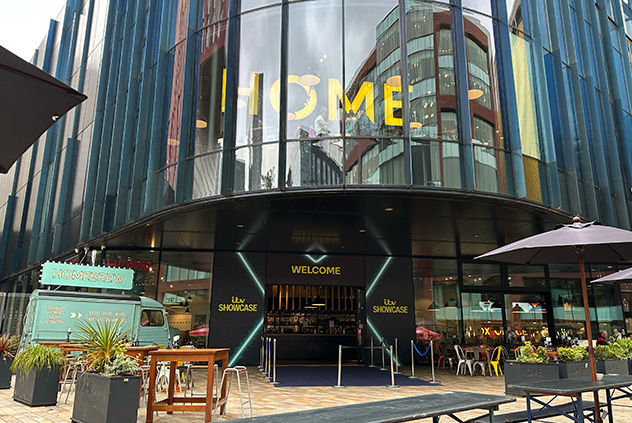ITV announces free campaign measurement at Showcase

ITV will offer advertisers a free ad campaign measurement service as part of a range of measures designed to help advertisers prove the effectiveness of TV’s contribution to a brand’s sales.
Geo-X by ITV, created by the broadcaster’s innovation division ITV Adlabs, was announced on stage at ITV Showcase in Manchester today, and will give brands the chance to test how campaigns perform in different areas of the country in order to improve their effectiveness.
The UK’s biggest commercial broadcaster used its annual Manchester upfronts event to push the value of its regional footprint, which sales and strategy executives described as having a unique ability to apply different weights of advertising to a set of geographic test and control areas.
Kate Waters, director of client strategy and planning, told an audience of around 500 that Geo-X will enable advertisers to run “geo experiments” to prove the effectiveness of their advertising campaigns against a large number of campaign outcomes.
It is a free measurement consultancy for all ITV advertisers (with no minimum spend) and will be entirely scalable with self-serve options.
How ITV says Geo-X will work
“Geographic experiments are the strongest evidence available to marketers of the effectiveness of above the line campaigns and Geo-X by ITV uses regional tests to reveal the hidden effects of TV”, ITV said.
The tool locates advertisers’ sales and web traffic data with more accuracy than has been possible before, including modelling and adjusting for IP address geolocation accuracy. It analyses multiple performance indicators, including sales, visits, sources of web traffic, search, demographic response and brand tracking metrics to produce a fully rounded view of the outcomes from TV advertising.
ITV Adlabs has created a geolocation resource for UK postcodes, Google Analytics location data and Google search marketing areas. It is able to account for the overlaps in TV regions when analysing responses, removing “grey areas” between TV regions in store sales or in customer delivery data, to achieve true test and control.
Waters said that, if brands use all the tools and data that ITV now as, their geo tests could be “up to twice as sensitive” at finding the value that TV advertising creates. This would, she said, give marketers the confidence to “walk in to see your CFOs and be absolutely confident you’ve got robust statistics and rigorous proof points for how TV [advertising] works.”
Many marketers, at least privately, complain that advertising budgets are seen as a cost and not as a investment by their organisation’s leadership. At The Media Leader‘s The Future of Brands event last month, a private invite-only session of marketers revealed that “more influence” in the boardroom, particularly in a tough economy, was their number-one concern.
The Geo X solution, therefore, is about giving advertisers more confidence to invest in TV in a digital media system that is become more complex, Water explained. “The flip side of complexity is less clarity, but if you work in TV that’s a particular problem when trying to figure out how TV advertising works,” she said.
“TV is a wonderfully weird medium. There are lots of direct effects but lots of indirect effects, too…. What TV really does is amplify the effect of all those channels that you reply upon.”
Waters also revealed new research which appears to show that direct-response TV advertising delivers four times as much value when bought in peaktime compared to daytime dayparts, as is typically done. She described peak as “the Duracell bunny” because it “keeps going for 90 days” after a campaign’s launch.
More announcements

ITV publicised this year’s Showcase event as being “all about growth” and wheeled out senior executives to explain how the broadcaster can be a “multiplier for your brand and business”.
Despite being opened by a comedy act, Just These Please (pictured, above), the event was designed to showcase the broadcaster’s technical offerings for agency specialists and self-serve ad buyers at brands.
Alongside Jason Spencer, ITV’s Manchester-based business development director, managing director commercial Kelly Williams announced new numbers for streaming service ITVX, which launched six months ago as a replacement for ITV Hub.
ITVX also heralded a change in content approach for the business to be a “digital-first” platform, with shows such as Without Sin, a psychological thriller starring Vicky McLure (Line of Duty) launching first on streaming. Without Sin began showing on linear TV last week, but has been available on ITVX since December.

ITV revealed that 2 million viewers watched the show on ITVX, with another 4 million turning into the first episode on ITV1 on 15 May. Spencer said ITV estimates the ”streaming-first” strategy yielded an additional one million total viewers than if the company had adopted a traditional linear-first approach.
More broadly, Williams revealed the company had been “blown away” by ITVX’s contribution to the business in its first six months. It had contributed a “141% increase in light viewers”, a 36% increase in monthly active users, with 500% (6x) audience growth on Sky and Virgin Media platforms. Since launch the platform has added 3.1 million registered users to 39 million total.
The annual ITV Showcase is the company’s second-biggest sales publicity event after the more content-focused Palooza event in London in the run-up to Christmas. Now in its 11th year, it is now the UK’s biggest UK media sales event in the North-West of England, which has become a hugely significant part of the country’s advertising industry, particularly for start-up brands and online advertising specialists.
About 30% of the event’s 500-strong attendee list are marketers and in-house media-buyers at advertisers, while the vast majority of the remainder are media agencies. WPP, Omnicom, Dentsu and Interpublic Group have significant presence in the region, as do a number of independent media agencies which focus on “performance” online buying and/or media strategy for digital-native brands and smaller advertisers.

ITV, meanwhile, has a long history of operating in the North-West. Since before the merger in 2003 to create a unified ITV business, Granada Television (now ITV Granada) has been an ITV franchisee since the 1950s. ITV is obliged by UK communications regulator Ofcom to produce 50% of its programmes outside London, and 10 years ago recommitted to Manchester as its northern hub with an £80m move to MediaCityUK in Salford.
The ITV North-West team creates over 1,000 ads a year for brands and employs an executive creative director and six producers, as well as a client strategy team.




